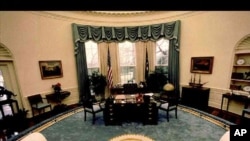Can a Former US President Claim ‘Executive Privilege’ Over His Presidential
The FBI’s seizure of classified documents during its recent search of former President Donald Trump’s Florida residence has renewed a debate over whether a former president can assert executive privilege, or the right to shield documents from disclosure.
Under the Presidential Records Act, presidential records belong to the government and must be handed over to the National Archives and Records Administration at the end of a president’s time in office.
The FBI is investigating how hundreds of pages of documents, some classified as top secret, ended up at Mar-a-Lago after Trump left the White House in January 2021.
Claiming the documents are “presumptively privileged,” Trump has asked a federal judge to stop the FBI from reviewing the records while an independent, third-party assessment is conducted.
Trump’s claim is not groundless. In 1977, the Supreme Court recognized the right of a former president to assert privilege over certain private communications, and a year later, the Presidential Records Act affirmed that right.
But Trump’s assertion of executive privilege in this case is highly unusual. Never before has a former president sought to prevent a current president from obtaining his presidential records from the National Archives, according to legal experts.
“To the best of my knowledge, it has never been done,” said Gary Schmitt, a senior fellow at the American Enterprise Institute, a conservative think tank.
Here is a look at executive privilege and the debate over Trump’s claim:
What is executive privilege?
It is a president’s right to keep sensitive communications and other presidential records confidential. The idea is that presidents need frank advice to discharge the duties of the office and that candor by advisers requires a promise of confidentiality.
Although the practice is not explicitly mentioned in the Constitution, the Supreme Court has recognized the presidential prerogative to keep certain records confidential. The executive branch has interpreted the privilege to cover three categories of documents and communications: state secrets, presidential communications and “deliberative” communications within agencies, according to a recent Congressional Research Service report.
The principle is not novel. Presidents going back to George Washington have claimed the privilege, in one form or another, to withhold information. It wasn’t until the 1970s, though, that the Supreme Court weighed in on the issue.
In 1974, then-President Richard Nixon, asserting that executive privilege allowed him to withhold sensitive information, refused to release White House audio recordings sought by a special counsel and seven defendants in the Watergate case.
While recognizing the “privilege of the confidentiality of presidential communications,” the Supreme Court ordered Nixon to turn over the tapes. The presidential privilege, the court said, was not “absolute.”
Does a former president have the right to assert executive privilege?
The question is the subject of some debate among scholars. Citing a landmark 1977 Supreme Court case regarding the constitutionality of…
Read More: Can a Former US President Claim ‘Executive Privilege’ Over His Presidential

